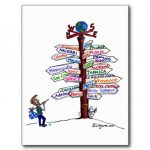Bin Laden to Big Society – Highlights from My Week Exploring the UK Impact Scene (Part 1)
“In the 70s,” he tells me, “I moved to Saudi Arabia because that is where someone in the finance business could make money. I routinely did business with the Bin Laden family.”
This was part of a conversation with a gentleman who is now investing in Africa, including investments in projects with a social objectives. He shared that after decades in the finance industry, he now felt secure enough that he could turn his attention to social investing – well, at least as long as it promised a “half decent” return.
The conversation got me thinking about the unintended consequences that can result from investing. Surely, the likeable English chap with whom I was chatting could not have known that the wealth he participated in creating would one day fuel a global conflict that has killed hundreds of thousands – if not millions – of people. But I also wonder if different results would follow in the future if we, as a society, made sure that we understood the motives and values of the people we help to make rich. Given that concentrated wealth can create suffering on a global scale, is there a responsibility to be more discriminating about the people we help to accumulate it?
During my big law firm days, I worked on financing transactions that created hundreds of millions of dollars of wealth for our clients. I knew that some of our clients were jerks and others were mysterious – including, for example, members of the Saudi royal family. But I never thought very critically about the clients we were serving, just as it never occurred to me at that time to think much about my consumption choices. I was more concerned with building a career at a prestigious law firm, and I spent my money on the same stuff as everyone else did.
Thankfully, I now know that making the right choices around the people I work with, the companies I support and how I spend my money are much more important that the amount of money that I make. Four years after my transition to working with impact investors and social enterprises, I am just now approaching the salary I made as an associate at the big firm over 10 years ago. And I couldn’t be happier.
The conversation with the English gentleman also provided a real life anecdote corroborating an article on impact investing that I recently read in the Financial Times. The Financial Times writes that the average impact investor is a professional male in his late 50s with a high degree of financial security. Is this how it should be? Is impact investing so risky that only those with substantial means dare to participate? I say no. I have investor clients that have designed diversified pool of impact assets, everything from real estate to public equities, and those portfolios have in some cases outperformed traditionally managed portfolios. Couldn’t this also be done for those at lower income levels?
All of this has reinvigorated my interest in developing a venture fund to invest in social enterprises that would trade on a public exchange. Let’s call it Feel Good VC. Once Feel Good VC is set up, anyone could log onto his or her Fidelity or E-Trade account and purchase (or sell) a share of Feel Good VC based on the current market price of the fund. We have actually spent a lot of time thinking about how to make this work, and even have materials we can share with the right potential partners.





